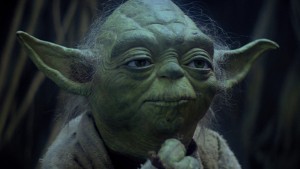
Like so many of you, I am anxiously awaiting the release of Star Wars Episode VII: The Force Awakens.
A long time ago in a galaxy far away…1977 actually…we were introduced to this most amazing epic, and appreciation has only grown over the ensuing years. The characters have become embedded in American culture.
For most fans, Star Wars is great entertainment, and it is definitely that…and much more.
The Star Wars series is eclectic. It combines many religious, philosophical and historic themes taken from a wide array of religions, including Zoroastrianism, Taoism, Stoicism, Nihilism, Christianity and also Judaism. A student of any of these religions will find something of their own faith somewhere in Star Wars.
College level classes have been taught on the mythology and symbolism that are so much a part of Star Wars. There is even a book entitled “Star Wars and Philosophy: More Powerful than You Can Possibly Imagine” which is a compilation written by various college professors.
Most prominently, the conflict between “light” and “dark” sides of the Force comes almost directly from Zoroastrianism and their intertwining connection certainly is a reflection of the yin and yang of Taoism. And there is much more. The strong ethical element to Star Wars bears a direct connection to various ideals of Buddhism and Stoicism.
The virtues the Jedi shares with the Stoic sages are patience, commitment, seriousness, calm, caution, benevolence, and, of course, wisdom. Given all these virtues, Yoda is what the ancient Stoics described as the sage, the ideal person who has perfected reason and achieved complete wisdom. Speaking of Yoda, students of Hebrew will recognize several choices of names in the films as having Hebrew roots. Yoda most obviously comes from the Hebrew word Yodea, meaning one with knowledge.
Both Judaism and Christianity are reflected in Star Wars, philosophically and historically. Particularly concerning the depiction of the eternal conflict between good and evil, students of Judaism will recognize the yetzer ha-tov vs. the yetzer ha-ra, the opposing human inclinations present in every person. There may even be a connection to the Dead Sea Scrolls, one of which is entitled “The War of the Sons of Light Against the Sons of Darkness.”
The struggle between good and evil in Star Wars seems closer to the Christian concept where good and evil are competing and independent powers battling over the domain of creation. Judaism, of course, sees everything as emanating from a single Creator. This includes evil that has no independent will of its own to oppose God, but is also under God’s domain, as is portrayed in the Book of Job.

Judaism teaches that the source of Light and Darkness are One and the same, as it says in the prayer book: “Blessed art You, Eternal One, our God, Ruler of the Universe, Who forms light and creates darkness, Who makes peace and creates all things.” The source for this line of liturgy can be found in the Hebrew Bible, Isaiah 45:7: “Who forms light and creates darkness, Who makes peace and creates evil; I am the Eternal One, Who makes all these.”
The ever-present and overarching theme of Star Wars is that of the Force that endows these films with their undeniable spiritual orientation. The Force is what gives a Jedi his power. It’s an energy field created by all living things. It binds the galaxy together.
Call it what you like; it sounds like God to me.
The expression “May the Force be with you” is emblematic of the Star Wars legacy. This line is invoked by at least one character in each of the Star Wars movies. To those familiar with the Catholic Mass, these words seem to directly reflect Dominus vobiscum, the Latin phrase meaning “The Lord be with you” – the ancient salutation and blessing traditionally used by the clergy in the Roman Catholic Mass, and several other Christian denominations.
In other ways, the Force has taken on Christian overtones. In “The Phantom Menace,” Anakin Skywalker (Darth Vader as a boy) is supposedly the result of a virgin birth.
And there are suggestions of Messianism as well. The idea of a foretold “Chosen One” who would restore balance to the Force is a theme running throughout the Star Wars films.
I do not believe that George Lucas set out to create a science fiction universe intended specifically to reflect Jewish history. Nevertheless, the allusions are apparent to Jews. Darth Vader and company are Nazis and Storm Troopers – the embodiment of all that is evil and destructive.
Since it is Chanukah, I should add that the heroes of Star Wars, the members of a “rebel alliance,” are the few against the many. They could be the Maccabees in outer space, the small band of determined fighters who struggled against the overwhelming power of the Greek Syrians, or they could be the partisans and defenders of the Warsaw Ghetto who did all that they could to resist the Nazis.
This brief essay actually is only scratching the surface. Stars Wars is so much more than science fiction. On so many levels, it is a serious endeavor dealing with universal human concerns that are confronted by all of the world’s religions. Its universalistic moral themes, as much as its originality and cinematic genius, are what endows Star Wars with timeless value.


Leave a Reply
You must be logged in to post a comment.